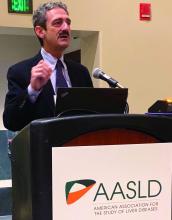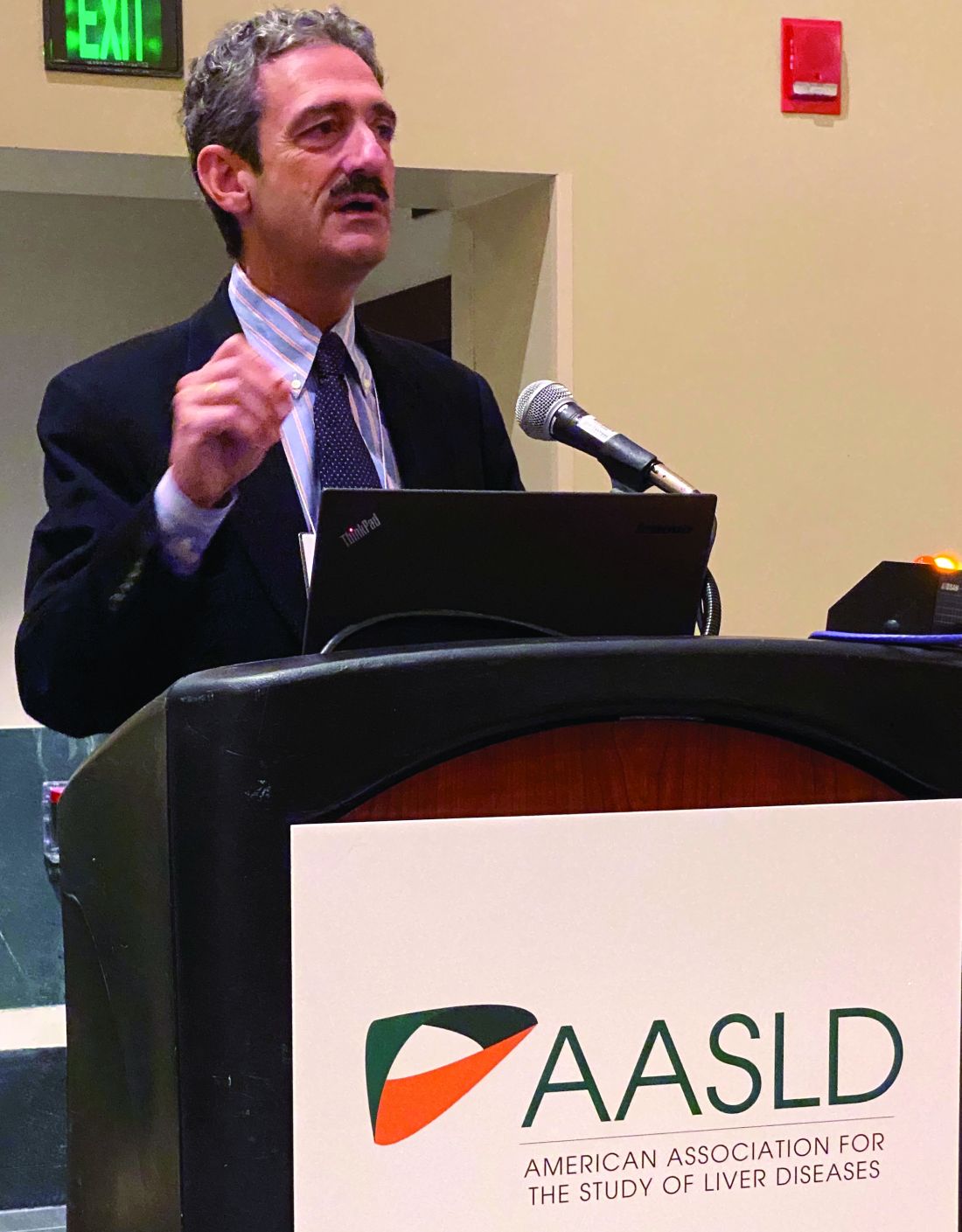User login
BOSTON – The combination of nivolumab and ipilimumab provided a “robust” clinical benefit and had manageable hepatic adverse events in a phase 2 study of sorafenib-treated patients with advanced hepatocellular carcinoma (HCC), an investigator said at the annual meeting of the American Association for the Study of Liver Diseases.
Response rates for the combination treatment exceeded 30% in CheckMate 040, with median overall survival approaching 23 months in one arm of this randomized trial, said Bruno Sangro, MD, PhD, of Clinica Universidad de Navarra, Pamplona, Spain.
The combination had a manageable safety profile with no new safety signals, and most immune-mediated adverse events resolved, including hepatic events, Dr. Sango said in an oral abstract session.
“The favorable benefit/risk profile observed we believe warrants further investigation in patients with HCC,” Dr. Sangro said in his presentation to attendees, adding that a phase 3 study of the combination is already ongoing.
On Nov. 11, 2019, Bristol-Myers Squibb announced its application for nivolumab plus ipilimumab for previously treated advanced HCC had been accepted for priority review by the Food and Drug Administration, which had furthermore granted breakthrough therapy designation for that potential indication.
In September 2017, the FDA approved nivolumab as monotherapy for patients with HCC previously treated with sorafenib. That action was based on results from CheckMate 040 showing on overall response rate of 14% and a median overall survival of 15 months, Dr. Sangro said.
The combination of the programmed death–1 inhibitor nivolumab and the CTLA-4 inhibitor ipilimumab, which has shown durable responses in other tumor types, may promote synergistic immune activity in HCC through their distinct but complementary mechanisms, according to the investigator.
The first report on the combination of nivolumab plus ipilimumab in CheckMate 040, reported earlier this year at the annual meeting of the American Society of Clinical Oncology, indicated that the combination produced responses that were robust and durable.
Dr. Sangro reported data on 148 patients with advanced HCC previously treated with sorafenib randomized to one of three different dosing regimens with nivolumab plus ipilimumab.
Response rates ranged from 31% to 32% in the three arms, while one particular dosing regimen given every 3 weeks for four cycles had a median overall survival of 22.8 months.
“Just to give a perspective, let me remind you that patients receiving placebo post sorafenib in a number of phase 3 trials have very consistently shown median overall survivals of around 8 months,” Dr. Sangro told attendees.
Hepatic treatment-related adverse events of any grade reported within 30 days of the last dose were seen in 39% of patients in that arm, Dr. Sangro said.
Hepatic events thought to be immune mediated were typically managed with a short course of high-dose corticosteroids, according to Dr. Sangro, who said no patients rechallenged with treatment experienced a recurrence of the event.
Most of the hepatic adverse events occurred early, with a median time to onset of 5.6-8.1 weeks, he said, and most resolved at a median of 6.1-7.9 weeks.
In the ongoing phase 3 CheckMate 9DW study, patients with advanced HCC who are naive to systemic therapy are being randomized to the combination of nivolumab plus ipilimumab, or to the investigators’ choice of either sorafenib or lenvatinib, with a primary endpoint of overall survival, Dr. Sangro said.
The study was supported by Bristol-Myers Squibb and ONO Pharmaceutical. Dr. Sangro reported disclosures related to Adaptimmune, AstraZeneca, Bayer, Bristol-Myers Squibb, BTG, Merck, Onxeo, Sirtex Medical, Terumo, H3 Biomedicine, Ipsen, Lilly, Exelixis, Roche, and Ipsen.
SOURCE: Sangro B et al. The Liver Meeting 2019, Abstract 200.
BOSTON – The combination of nivolumab and ipilimumab provided a “robust” clinical benefit and had manageable hepatic adverse events in a phase 2 study of sorafenib-treated patients with advanced hepatocellular carcinoma (HCC), an investigator said at the annual meeting of the American Association for the Study of Liver Diseases.
Response rates for the combination treatment exceeded 30% in CheckMate 040, with median overall survival approaching 23 months in one arm of this randomized trial, said Bruno Sangro, MD, PhD, of Clinica Universidad de Navarra, Pamplona, Spain.
The combination had a manageable safety profile with no new safety signals, and most immune-mediated adverse events resolved, including hepatic events, Dr. Sango said in an oral abstract session.
“The favorable benefit/risk profile observed we believe warrants further investigation in patients with HCC,” Dr. Sangro said in his presentation to attendees, adding that a phase 3 study of the combination is already ongoing.
On Nov. 11, 2019, Bristol-Myers Squibb announced its application for nivolumab plus ipilimumab for previously treated advanced HCC had been accepted for priority review by the Food and Drug Administration, which had furthermore granted breakthrough therapy designation for that potential indication.
In September 2017, the FDA approved nivolumab as monotherapy for patients with HCC previously treated with sorafenib. That action was based on results from CheckMate 040 showing on overall response rate of 14% and a median overall survival of 15 months, Dr. Sangro said.
The combination of the programmed death–1 inhibitor nivolumab and the CTLA-4 inhibitor ipilimumab, which has shown durable responses in other tumor types, may promote synergistic immune activity in HCC through their distinct but complementary mechanisms, according to the investigator.
The first report on the combination of nivolumab plus ipilimumab in CheckMate 040, reported earlier this year at the annual meeting of the American Society of Clinical Oncology, indicated that the combination produced responses that were robust and durable.
Dr. Sangro reported data on 148 patients with advanced HCC previously treated with sorafenib randomized to one of three different dosing regimens with nivolumab plus ipilimumab.
Response rates ranged from 31% to 32% in the three arms, while one particular dosing regimen given every 3 weeks for four cycles had a median overall survival of 22.8 months.
“Just to give a perspective, let me remind you that patients receiving placebo post sorafenib in a number of phase 3 trials have very consistently shown median overall survivals of around 8 months,” Dr. Sangro told attendees.
Hepatic treatment-related adverse events of any grade reported within 30 days of the last dose were seen in 39% of patients in that arm, Dr. Sangro said.
Hepatic events thought to be immune mediated were typically managed with a short course of high-dose corticosteroids, according to Dr. Sangro, who said no patients rechallenged with treatment experienced a recurrence of the event.
Most of the hepatic adverse events occurred early, with a median time to onset of 5.6-8.1 weeks, he said, and most resolved at a median of 6.1-7.9 weeks.
In the ongoing phase 3 CheckMate 9DW study, patients with advanced HCC who are naive to systemic therapy are being randomized to the combination of nivolumab plus ipilimumab, or to the investigators’ choice of either sorafenib or lenvatinib, with a primary endpoint of overall survival, Dr. Sangro said.
The study was supported by Bristol-Myers Squibb and ONO Pharmaceutical. Dr. Sangro reported disclosures related to Adaptimmune, AstraZeneca, Bayer, Bristol-Myers Squibb, BTG, Merck, Onxeo, Sirtex Medical, Terumo, H3 Biomedicine, Ipsen, Lilly, Exelixis, Roche, and Ipsen.
SOURCE: Sangro B et al. The Liver Meeting 2019, Abstract 200.
BOSTON – The combination of nivolumab and ipilimumab provided a “robust” clinical benefit and had manageable hepatic adverse events in a phase 2 study of sorafenib-treated patients with advanced hepatocellular carcinoma (HCC), an investigator said at the annual meeting of the American Association for the Study of Liver Diseases.
Response rates for the combination treatment exceeded 30% in CheckMate 040, with median overall survival approaching 23 months in one arm of this randomized trial, said Bruno Sangro, MD, PhD, of Clinica Universidad de Navarra, Pamplona, Spain.
The combination had a manageable safety profile with no new safety signals, and most immune-mediated adverse events resolved, including hepatic events, Dr. Sango said in an oral abstract session.
“The favorable benefit/risk profile observed we believe warrants further investigation in patients with HCC,” Dr. Sangro said in his presentation to attendees, adding that a phase 3 study of the combination is already ongoing.
On Nov. 11, 2019, Bristol-Myers Squibb announced its application for nivolumab plus ipilimumab for previously treated advanced HCC had been accepted for priority review by the Food and Drug Administration, which had furthermore granted breakthrough therapy designation for that potential indication.
In September 2017, the FDA approved nivolumab as monotherapy for patients with HCC previously treated with sorafenib. That action was based on results from CheckMate 040 showing on overall response rate of 14% and a median overall survival of 15 months, Dr. Sangro said.
The combination of the programmed death–1 inhibitor nivolumab and the CTLA-4 inhibitor ipilimumab, which has shown durable responses in other tumor types, may promote synergistic immune activity in HCC through their distinct but complementary mechanisms, according to the investigator.
The first report on the combination of nivolumab plus ipilimumab in CheckMate 040, reported earlier this year at the annual meeting of the American Society of Clinical Oncology, indicated that the combination produced responses that were robust and durable.
Dr. Sangro reported data on 148 patients with advanced HCC previously treated with sorafenib randomized to one of three different dosing regimens with nivolumab plus ipilimumab.
Response rates ranged from 31% to 32% in the three arms, while one particular dosing regimen given every 3 weeks for four cycles had a median overall survival of 22.8 months.
“Just to give a perspective, let me remind you that patients receiving placebo post sorafenib in a number of phase 3 trials have very consistently shown median overall survivals of around 8 months,” Dr. Sangro told attendees.
Hepatic treatment-related adverse events of any grade reported within 30 days of the last dose were seen in 39% of patients in that arm, Dr. Sangro said.
Hepatic events thought to be immune mediated were typically managed with a short course of high-dose corticosteroids, according to Dr. Sangro, who said no patients rechallenged with treatment experienced a recurrence of the event.
Most of the hepatic adverse events occurred early, with a median time to onset of 5.6-8.1 weeks, he said, and most resolved at a median of 6.1-7.9 weeks.
In the ongoing phase 3 CheckMate 9DW study, patients with advanced HCC who are naive to systemic therapy are being randomized to the combination of nivolumab plus ipilimumab, or to the investigators’ choice of either sorafenib or lenvatinib, with a primary endpoint of overall survival, Dr. Sangro said.
The study was supported by Bristol-Myers Squibb and ONO Pharmaceutical. Dr. Sangro reported disclosures related to Adaptimmune, AstraZeneca, Bayer, Bristol-Myers Squibb, BTG, Merck, Onxeo, Sirtex Medical, Terumo, H3 Biomedicine, Ipsen, Lilly, Exelixis, Roche, and Ipsen.
SOURCE: Sangro B et al. The Liver Meeting 2019, Abstract 200.
REPORTING FROM THE LIVER MEETING 2019

